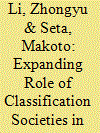| Srl | Item |
| 1 |
ID:
105901


|
|
|
|
|
| Publication |
2011.
|
| Summary/Abstract |
There is now a fairly substantial literature on private global business regulation which focuses on the rise of non-governmental and private regulatory systems alongside traditional state-based systems. These private systems cross national borders and impact on international trade which, in the intergovernmental realm, is governed by the rules of the World Trade Organization (WTO). In this article, the authors argue that while in principle private global regulatory trade regimes do not fall under WTO jurisdiction, in practice they are difficult to keep separate. They therefore have the potential to become a concern within the WTO, not only in legal terms, but also from a political perspective because private global regulatory schemes may (re)introduce the distortions into international trade that WTO rules sought to remove. In some cases, a hybridisation of standards occurs as private standards are recognised by public regulatory structures. National governments may find themselves squeezed between their international obligations and the pressures of their citizens, either to respond to consumer concerns themselves and risk being in conflict with their international obligations or to respond to producers seeking action against 'private red tape' which is nominally beyond the scope of the WTO. The article takes as its case study an international business-to-business agri-food standards body, GLOBALG.A.P., and explores the issues that arise for global trade governance from the growth in private regulation.
|
|
|
|
|
|
|
|
|
|
|
|
|
|
|
|
| 2 |
ID:
188877


|
|
|
|
|
| Summary/Abstract |
Private actors and their roles in conserving the marine environment have attracted increasing attention. Although classification societies were originally designed as industrial organizations developing internal standards on hull and machinery, their contributions to the marine environmental protection should not go ignored. As exemplified by the Ballast Water Management (BWM) Convention, an international shipping instrument on ballast discharge for which the implementation process was subject to technological uncertainties, their contributions can be described in three ways: verification on behalf of states as “recognized organizations”; participation in International Maritime Organization (IMO) sessions; and establishment of their own standards. It is argued that these multiple functions reveal the competence of classification societies to tackle vessel-source pollution, and further, that their technical know-how and firsthand experience accumulated from shipping practice demonstrate their potential to address other complicated marine environmental issues where experience and compliance technologies are essential. However, the expanding focus of classification societies to marine environmental issues should proceed with caution. A much under-discussed point is the impact of classification rules and standards developed by the International Association of Classification Societies (IACS) on international shipping conventions as agreed by states. Though it cannot be said that classification societies are making their own vessel-source discharge standards independent from the IMO lawmaking process, the Unified Requirements on BWM system installation illustrate that obligations under international instruments could be de facto complemented by industrial standards, despite the fact that no provisions incorporating the latter are explicitly spelled out in the former. Given the noticeable lack of state consent throughout the private standard-setting process and the near-universal applicability of IACS standards, legitimacy concerns arise as to whether it is justified for classification societies to wield such an impact on the development of vessel-source pollution requirements, affecting both states and other maritime stakeholders. In this respect, a global administrative law perspective is taken to examine in what ways their legitimacy could be challenged.
|
|
|
|
|
|
|
|
|
|
|
|
|
|
|
|